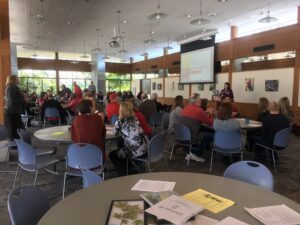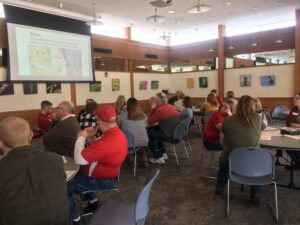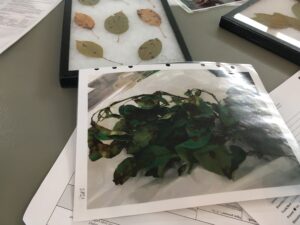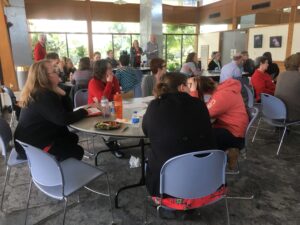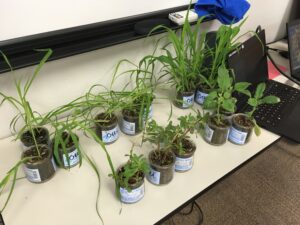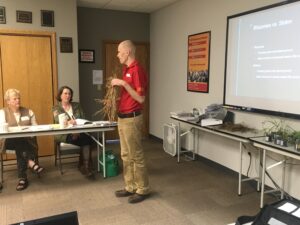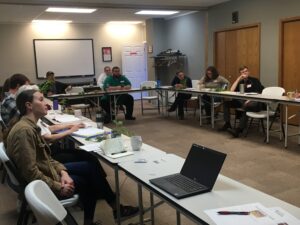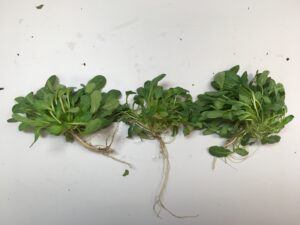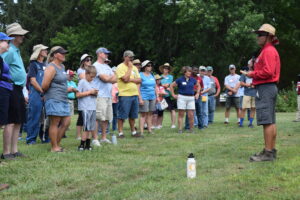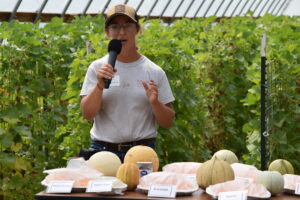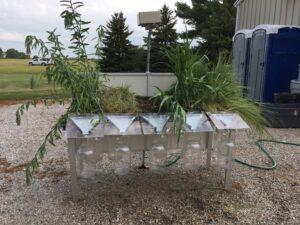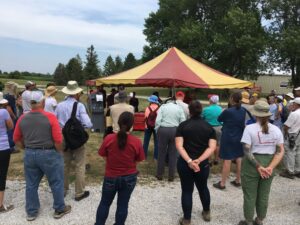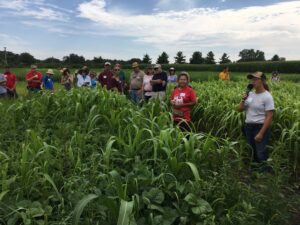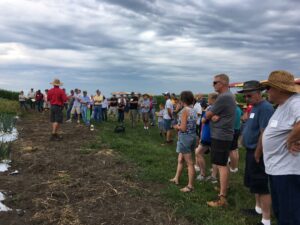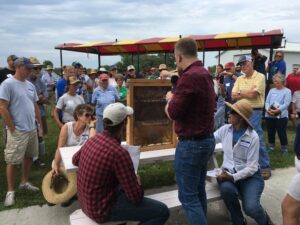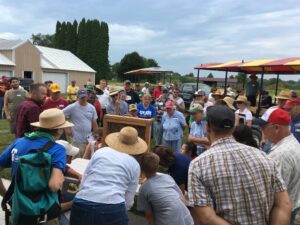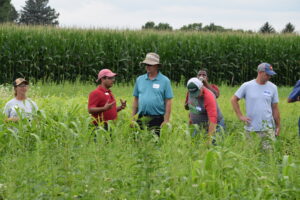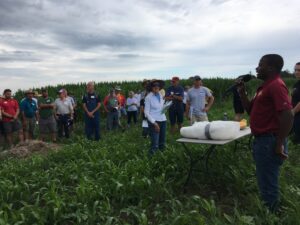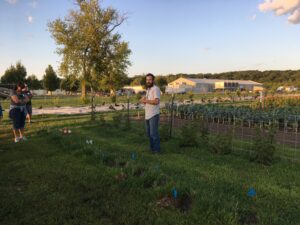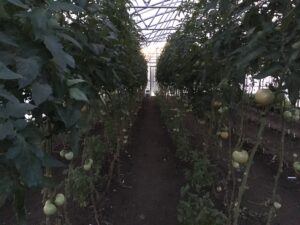Final report for ENC17-161
Project Information
Developing capacity in the area of integrated vegetable pest management is critical in building sustainable vegetable production systems. The primary objective of this proposal is to train and educate county horticulturists, extension educators, local food professionals, regional food systems working group members, and industry and community leaders on integrated pest management (IPM) tools and techniques in vegetable production. These individuals are often at the front line interacting with commercial vegetable growers and market gardeners.
Building capacity in these individuals in the area of pest identification, disease diagnostics, crop rotation planning, cover cropping, and IPM tools (sticky traps, scouting, beneficial insects, row covers, reduced risk insecticides, sanitation, resistant crop varieties, trap cropping, etc.) will significantly enhance services and support these individuals offer to vegetable growers. A long-term outcome of this object would include reduced response time and correct diagnosis of grower issues and effective implementation of IPM tools and strategies in our farming communities. In order to achieve project goals, we will organize statewide pest management hands-on training workshops, on-site pest management and diagnostic clinic at Amish and Mennonite auction houses, a pest management short course, and trips to regional fruit and vegetable conferences that include tracks/sessions on IPM in vegetable production. These activities will provide increased training and learning opportunities for our target audience and enhance their knowledge and understanding of IPM and related topics.
We envision multiple outcomes from this project, although outcomes that affect behavioral changes are something we are shooting for. Short term goals of this project are to: 1) Obtain feedback on challenges and issues that extension staff and local food professional in the area of IPM in vegetable production systems, 2) Create awareness among extension personnel, government staff, agricultural professionals, and organization leaders about IPM tools and practices and ways to implement them in commercial vegetable production, and 3) educate and train agricultural professionals on various aspects of pest identification, disease diagnostics, crop rotation planning, cultivar selection, cover cropping, and IPM tools (sticky traps, scouting, beneficial insects, row covers, reduced risk insecticides, sanitation, resistant crop varieties, trap cropping, etc.) in vegetable production systems. We strongly believe that the broad spectrum of activities included in this project such as surveys, workshops, webinars, on-site diagnostic clinics, and online resources will serve to effectively disseminate latest and most up-to date information to growers, extension personnel, and stakeholders.
Intermediate and long term goals of this project are to: a) Develop expertise among participants to better assist fruit and vegetable growers with questions on IPM in vegetable production, b) Develop diverse and resilient vegetable cropping systems by integration concepts of crop rotation, cover crops, fertility management, and soil quality and health, and d) Support the growing fruit and vegetable industry by emphasizing new and innovative production techniques that are key to maintaining long-term farm sustainability and productivity. Our overall goal is to train, educate, and create a critical mass of extension educators and agricultural leaders with expertise and knowledge in basics, fundamentals, and advanced IPM tools. These individuals will assist growers in designing crop rotation plans, adoption of cover crops, identifying pests, understanding crop nutrient needs, fertility management plans, and understanding the value of soil quality and biology. Such collaborations install confidence in growers who are interested in developing/practicing diverse cropping systems. We foresee a long-term impact of this project as it trains and educates new extension field staffs who were hired few years ago. Building up capacity by training junior extension agents will serve the long-term vision of this project which is to promote stewardship of agricultural sustainability.
Cooperators
- (Educator)
Education
The project organized pest management workshops, In-service trainings, High tunnel vegetable production and pest management short course, one-one consultations, online webinars, and professional development trips to regional conferences. The online methods consisted of webinars, zoom presentations, and emails that facilitated delivery of information on pest management tools and techniques and general vegetable production topics. The hands-on activities during the Horticulture In-service and county workshops comprised of properly identifying weeds, insects, physiological disorders, plant nutrient deficiencies. In order to reach out to underserved and underrepresented communities, a composting workshop was offered at the Red Earth Gardens, a community garden under the Meskwaki Nation, Sac & Fox Tribe of the Mississippi in Iowa.
Education & Outreach Initiatives
1. Educate and train ISU county horticulturists, extension educators, local food coordinators, and field specialists on IPM tools and strategies in vegetable production
2. Provide latest and up to date information on pest management tools and techniques
3. Provide hands on training opportunity through Plant and Insect Diagnostic Clinic at Iowa State University
Given the pandemic and rapid shutdown of University and county extension services, in 2020, the project could not organize a Horticulture Extension and Outreach In-Service training. The last training offered was on 27 February, 2019 at the Reiman Gardens, Ames, IA. The event was attended by ISU County horticulturist, extension educator, field specialist, local foods coordinator, and Master Gardener Coordinators. Sixty two participants attended the event. The agenda for the In-Service consisted of presentations from experts on topics that included integrated pest management (cucumber beetle), spring frost protection in fruit crops, disease identification, and status of horticultural crop production in Iowa. In addition several experts were assigned to seven round tables that facilitated 10-15 minute discussion on the following topics: 1. Vegetable production, 2. Fruit production, 3. Organic horticulture, 4. Trees and ornamentals, 5. Insect ID, 6. Plant Diseases, and 7. Plant ID. Similar to the previous year a hands-on insect and disease identification module was offered wherein participants had to individually and collectively identify insects and diseases using herbarium specimens, and live plants. Below pictures are from the 2019 Horticulture In-Service Training for ISU Extension and Outreach Staff and Master Gardeners
Learning and action outcomes:
- Participants learned about several IPM tools and techniques
- Specific and detailed information on cucumber beetle management in cucurbit crops.
- Hands-on insect and disease identification learning opportunity
- Participants received information on proper sampling, bagging, and shipping of plant samples to the Plant and Insect Diagnostic Clinic.
- Exposure to several aspects of horticulture (fruits, ornamentals, organic ag, trees, etc.)
1. Address grower questions regarding commercial vegetable production
2. Provide information on resources and services available through ISU Extension and Outreach and USDA SARE.
3. Connect with local growers and community leaders to strengthen local food initiatives
The pandemic did not allow to participate in the annual event organized by the non-profit organization Healthy Harvest of Northern Iowa. The project didset up a booth in 2019. This event promotes a deeper understanding of how to engage in the local food system. The clinic provided information on production topics such as weed management, insect and diseases, and marketing channels for local foods. Few growers brought live plant samples to identify the pest and learn about symptoms and signs of infestation.
1. Face-to-face consultation provided to local vegetable growers on production topics
2. Growers received information on existing resources (Extension publications, bulletins, online webinars, disease compendiums, SARE resources)
3. Direct engagement with members of Healthy Harvest of Northern Iowa. This led to further engagement and field visits to commercial grower plots in the 2019 growing season. As a result of those visits, we were able to provide recommendations on fertility management that led to reduction of fertilizer inputs and interest among growers to use cover crops in their production systems.
1. Educate and train county horticulturists, extension educators, local food coordinators, and field specialists on IPM tools and strategies in vegetable production
2. Provide latest and up to date information on pest management tools and techniques
3. Hands-on weed ID exercise for effective weed management
4. Provide information on resources and services available through USDA North Central SARE and Iowa State University
5. Highlight SARE cover crop resource (Managing Cover Crops Profitably) and the Midwest Vegetable Production Guide
In April 2020, a virtual pest management video series was created and launched which included detailed information on vegetable production and management in Iowa. This video series covered a wide range of topics, including:
- Scouting, identifying and managing vegetables diseases
- Identifying and managing specific pests of vegetables
- Irrigation and high tunnels
- Understanding the importance of soil and the nutrients that feed plants
The video series can be accessed by clicking the link below:
https://www.youtube.com/playlist?list=PLzZRnFJ154EJ8qvX1EvEwGvhHUFgDmopm
In April 2019, a hands-on pest management workshop was organized in Dubuque, IA. The workshop provided comprehensive and in-depth information on pest identification, disease diagnostics, cultivar selection, cover cropping, and IPM tools (sticky traps, scouting, beneficial insects, row covers, reduced risk insecticides, sanitation, resistant crop varieties, trap cropping, etc.) in vegetable production systems. The hands-on portion of the workshop involved quizzing participants on correctly identifying commonly seen weeds in vegetable production systems. Below are pictures from the 2019 workshop.
- Participants went through a hands-on pest management activity which quizzed them on several weeds, insects, disease, and nutrient deficiency symptoms.
- The workshop included presentations on key insect and disease pests of vegetable crops which helped participants better understand insect/disease life cycles and management strategies.
- One of the presentations focused on weed management using sustainable techniques such as mulches, cover crops, stale seedbed technique, etc.
1. Educate and train county horticulturists, extension educators, local food coordinators, and field specialists on IPM tools and strategies in vegetable production
2. Provide latest and up to date information on pest management tools and techniques
3. Provide information on resources and services available through USDA North Central SARE and Iowa State University
A biweekly webinar series highlighting several sustainable vegetable production related topics was organized from May - August in 2019 and 2020. Each webinar hosted an expert/specialist who covered a specific horticulture related topic in detail. Webinars were largely attended by county horticulturists, local food coordinators, and field specialists. A total of seven webinars were offered in 2020 which reached 220 participants (attending live + downloads from the archive). In 2019, a total of eight webinars were offered which reached 284 participants. Webinars were recorded and posted on ISU Cybox for future viewings and downloads.
County horticulturists, local food coordinators, and field specialists utilized the information provided in webinars to educate and update their clients in their counties and communities. Special emphasis was given to provide timely information on insect and disease outbreaks, weather effects on plantings, nutrient deficiency symptoms, and high tunnel vegetable production.
1. Provide relevant and up-to-date information on pest management in vegetable crops
2. Highlight sustainable pest management tools and techniques
3. Demonstrate the use of new approaches such as grafting as a pest management tool
4. Showcase the value of high tunnels and common pests and their management inside them
In 2020, due to the pandemic, we were not able to host a Fruit and Vegetable Field Day at the Horticulture research Station. In 2019, a Fruit and Vegetable Field Day was organized on August 5 which featured research and demonstration projects on fruit and vegetable production for commercial growers, extension personnel, non-profit organizations and Master Gardeners. The event provided an opportunity for attendees to evaluate research and extension projects focusing on high tunnel vegetable production and gain information on heirloom tomato production, impacts of cover crop on soil erosion, pest management in cucurbit crops, onion thrips management, and honey bee health and behavior. Below are pictures from the 2019 field day.
1. Real-time assessment of sustainable pest management approaches in vegetable crops
2. Participants learned about major insect and disease pests of vegetable crops
3. Peer-to-peer learning opportunity for growers who attended the event
4. Participants watched a live demo of the cover crop rainfall simulator apparatus that shows the benefits of cover crops in reducing soil erosion
1. Learn about new and innovative vegetable production tools and approaches from growers, ag professionals, researchers, and entrepreneurs from the Midwest region
2. Expose Iowa growers and extension professionals to large vegetable growers from Michigan
3. Learn about latest research developments in crop production and pest management
4. Provide a platform to share resources, knowledge, and expertise in the area of vegetable crop production and connect agricultural educators to professionals in the area of sustainable vegetable production
The pandemic adversely affected the professional development trip for growers. It was high risk to take 10-15 participants in ISU vans to the Great Lakes Expo, so the trip was cancelled. In 2019, the project supported an educational /professional development trip for 10 individuals (extension staff, agricultural educators, and leaders from grower organizations) to Great Lakes Fruit, Vegetable and Farm Market Expo (GLEXPO) in Grand Rapids, MI. List of people who participated in the trip in 2019 is below:
Chris Deal, Iowa Fruit and Vegetable Growers Association
Scott Koepke, Indian Creek Nature Center
Carly McAndrews, Practical Farmers of Iowa
Moriah Bilenky, Research Technician, ISU
Brandon Carpenter, Research Staff, Horticulture Research Station
Ajay Nair, ISU Extension and Outreach
Dominic Snyder, Manager, Muscatine Island Research Farm
Chad Arnold, Agriculture Specialist, ISU
Ray Kruse, Local Foods Coordinator, Dubuque County Extension
Paul K., Commercial vegetable grower, Dubuque, IA
Participants who attended the Great Lakes Expo stated that they were able to gather useful information on several aspects of vegetable production (soil fertility, pest management, cover crops, marketing, etc.). They found their interactions with large scale vegetable producers from Michigan useful and highly productive. Many Iowa growers were planning to implement some of the new techniques they learned in their own farms. The educational tracks and the tools and equipment expo exposed Iowa growers to specialty crop vendors, new tools, supplies, and latest and most innovative production techniques.
1. Provide basic understanding of composting process
2. Highlight uses of composts in vegetable production
3. Provide information on ingredients used in composting process
4. Demonstrate use of compost in high tunnel tomato production
This event was organized in 2019. A composting workshop was organized on 27 August, 2019 at the Red Earth Gardens, a community garden managed by the Meskwaki Nation | Sac & Fox Tribe of the Mississippi in Iowa. The workshop provided comprehensive and in-depth information on ingredients to use and processing methods for compost production.
- Participants learned about proper way of composting waste materials
- Information was provided on temperature and moisture management during the composting process
- Participants observed the use of compost in high tunnel tomato production
Educational & Outreach Activities
Participation summary:
Learning Outcomes
Project Outcomes
The project so far was able to reach to county horticulturist, extension educator, field specialist, local foods coordinator, and Master Gardener Coordinators. In addition the on-site vegetable production booth at the event hosted by Healthy Harvest of Northern Iowa led to partnerships and connections with commercial vegetable grower sin the Mason City area. Many of the county horticulturists who attended the Horticulture In-Service program and webinars utilized the information provided to help commercial vegetable producers and community garden Master Gardeners volunteers.
The compost presentation at the Red Earth Gardens, Meskwaki Nation Sac & Fox Tribe of the Mississippi in Iowa in Tama was well received by the community. The Pest Management Workshop organized in Dubuque provided hands-on weeds and insect identification opportunity to many extension and outreach staff who would be using the skills acquired to help their clients.
